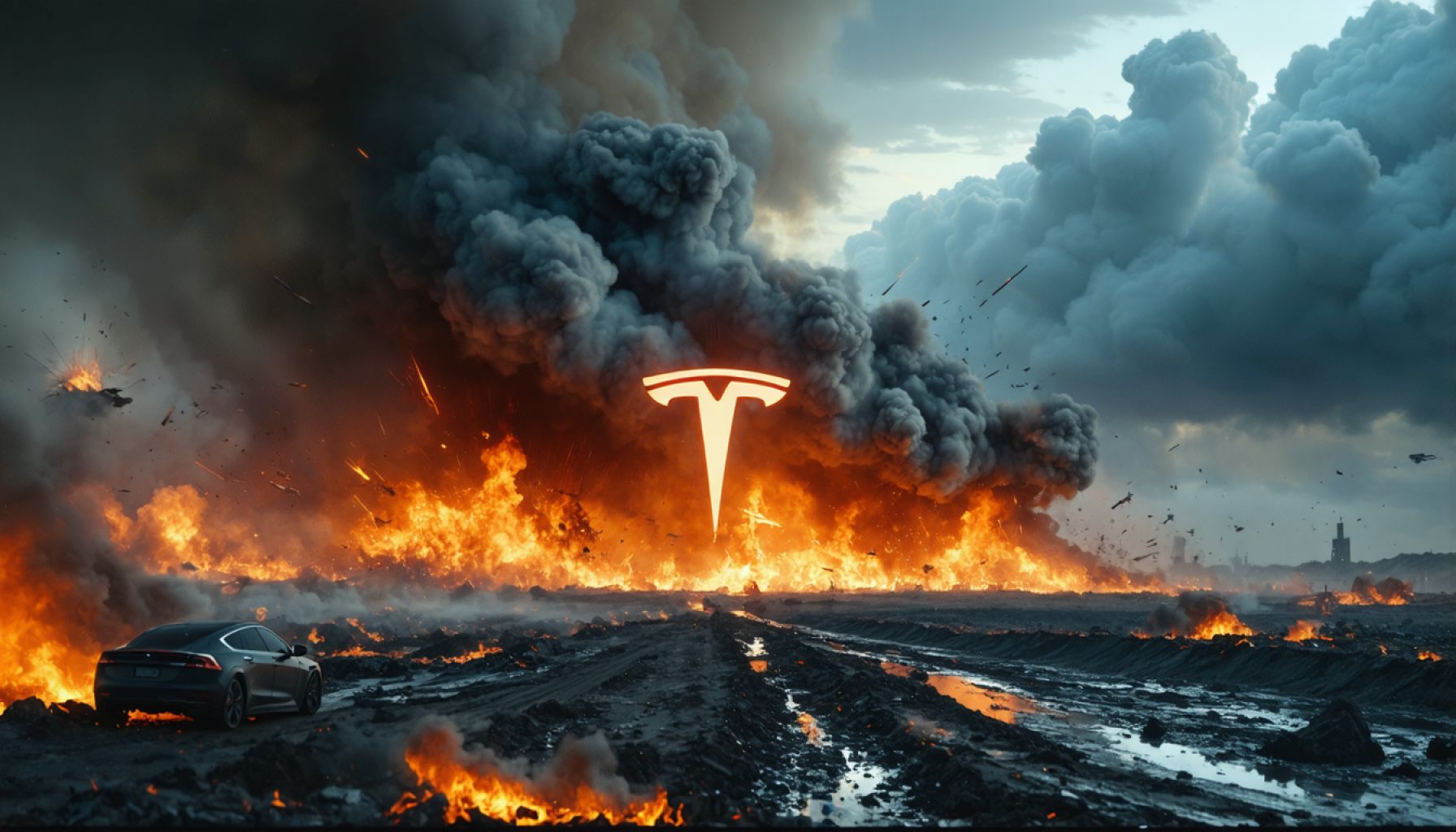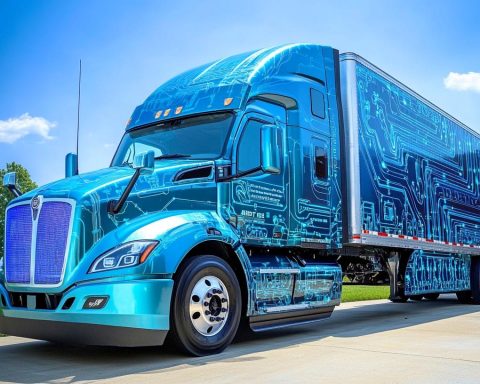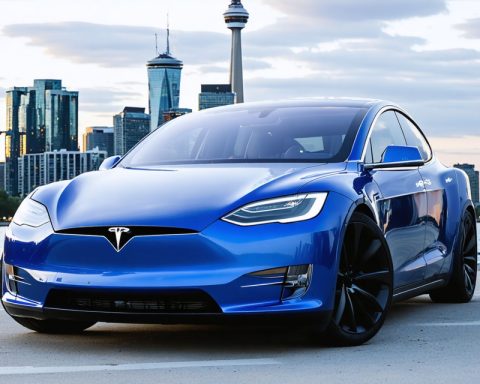- Tesla dealerships have become active protest sites, representing a clash between corporate influence and political dissent.
- The ‘Tesla Takedown’ movement targets Elon Musk and his perceived political affiliations, juxtaposing Tesla’s clean energy image with the political actions of its CEO.
- Protesters draw inspiration from ACT UP, focusing on visibility and disruption to highlight perceived inconsistencies in Tesla’s climate leadership.
- This activism underscores broader tensions between progressive ideals and entrenched corporate power, challenging the authenticity of climate leadership.
- The protests at Tesla showrooms raise critical questions about progress, profit, and accountability, illustrating the complex path to climate justice.
Underneath the sleek, futuristic designs of Tesla dealerships, a potent political drama unfolds, turning these modern showrooms into unlikely battlegrounds of resistance. Set against the backdrop of a divided nation, these protest hotspots symbolize a growing intersection of corporate influence and political dissent, reminiscent of past activist movements that have reshaped the sociopolitical landscape.
Streets once bustling with eco-conscious consumers now echo with chants and placards, as the ‘Tesla Takedown’ movement gains momentum. At the heart of this convergence is opposition not only to Elon Musk—whose bold investments in technology have drawn both awe and ire—but also to former President Donald Trump, who remains a polarizing figure in American politics. The protests at Tesla dealerships serve as a microcosm, illustrating the broader national tension between progressive ideals and entrenched corporate power.
Borrowing strategies from ACT UP, the renowned AIDS activist group known for its relentless energy and unyielding tactics, today’s activists emphasize visibility and disruption. This strategy reflects a calculated move to highlight the perceived hypocrisy of a company associated with environmental progress while its CEO dabbles in politics that some protestors believe undermine those very ideals.
For many, targeting a clean energy company might seem paradoxical, yet it signifies a deeper narrative: the grapple for authentic climate leadership amid personal and political affiliations. Tesla, once purely a synonym for innovation, now stands entangled in a web of political intrigue. The calculated targeting of its dealerships is as much about sending a message to Musk as it is about addressing the socio-political climate influenced by figures like Trump.
The takeaway from these gatherings is clear. In a world where corporations wield immense influence over public policy, activism must adapt, identifying new epicenters of powerful confluence, and demanding accountability from those at the helm, regardless of their sector.
Thus, the Tesla dealership—far more than a showroom for electric innovation—has become a stage for pressing societal questions about who drives progress, who profits from it, and how. In this continuing saga, the activists prove that the road to climate justice is as complex and multifaceted as the technology itself, urging each of us to examine where we stand on the timeline of progress and resistance.
Tesla Showrooms: The Unseen Battlefields of Political Resistance
Introduction
Tesla dealerships have transitioned from mere hubs of innovation to frontline stages in the ongoing political drama. With a backdrop of protest against Elon Musk and associations with figures like Donald Trump, Tesla showrooms embody the clash between aspirations for environmental progress and socio-political issues.
The Political Undertones Behind Tesla Protests
Paradox of Targeting Tesla
Tesla’s brand is often synonymous with clean energy and innovation. However, current protests at Tesla dealerships highlight a deeper paradox. Activists question the authenticity of a company symbolizing environmental progress while its CEO engages in political maneuvers perceived as contradictory to these ideals.
Historical Activist Tactics
Drawing inspiration from past activist movements such as ACT UP, modern protests adopt strategies of high visibility and disruption. This approach emphasizes the perceived inconsistency in Tesla’s environmental promises versus Musk’s political affiliations.
What Fuels the Protest Movement?
1. Corporate Influence on Policy: As corporations are seen increasingly impacting public policy, activists argue that Tesla, and by extension Musk, needs to be held accountable for the broader implications of corporate actions.
2. Climate Leadership: The protests reflect concerns about genuine leadership in climate initiatives. Tesla’s entanglement in political disputes raises questions about whether corporate and personal politics undermine environmental goals.
Real-World Use Cases and Implications
– Corporate Accountability: Lessons from Tesla protests can be applied to other companies, urging the need for transparency and alignment between corporate practices and public commitments to social values.
– Innovative Disruption: The strategic targeting of Tesla dealerships illustrates how activist movements can adapt to new forms and spaces of civic engagement, influencing public discourse.
Market Forecasts & Industry Trends
– Electric Vehicle (EV) Industry Growth: Despite the controversies, the demand for EVs continues to rise. The market is projected to reach significant growth driven by regulatory support and consumer awareness. Tesla remains a key player in this space.
– Sustainability Trends: As environmental concerns grow, companies will need to increasingly demonstrate authentic leadership in sustainability, impacting market positioning.
Pros and Cons Overview
Pros:
– Tesla remains a leader in electric mobility, setting benchmarks for innovation.
– Public discourse can lead to increased corporate responsibility.
Cons:
– Political affiliations may overshadow environmental achievements.
– Consumer trust could be affected by ongoing controversies.
Actionable Recommendations
1. Stay Informed: Consumers should research both the ecological benefits and the socio-political stances of companies before making purchasing decisions.
2. Engage Constructively: Reach out to companies for clarification on their policies and commitments, fostering more open channels of communication.
3. Support Diverse Leadership: Encourage companies to diversify leadership to reflect broader societal values and perspectives.
Conclusion and Quick Tips
Tesla showrooms, now central to political protest, underline the importance of transparency in environmental leadership. As the EV industry evolves, staying informed and engaging with companies can promote constructive dialogue and accountability. Whether through active dialogue or conscious consumerism, each action contributes to a nuanced understanding of corporate influence in public life.
















